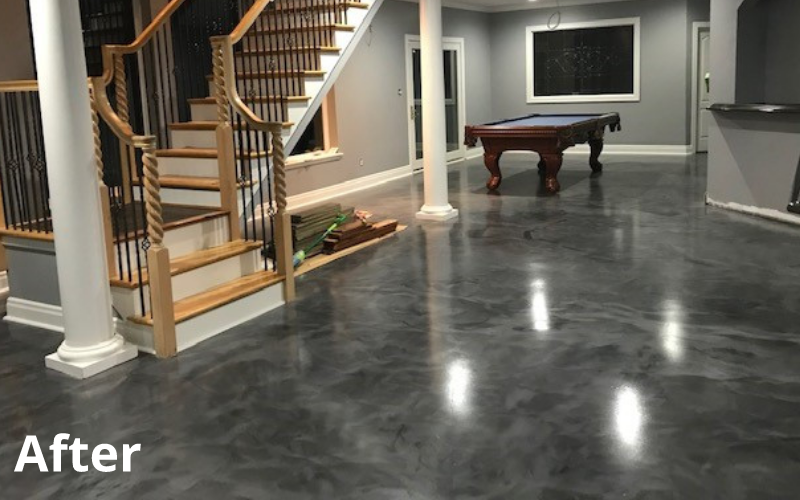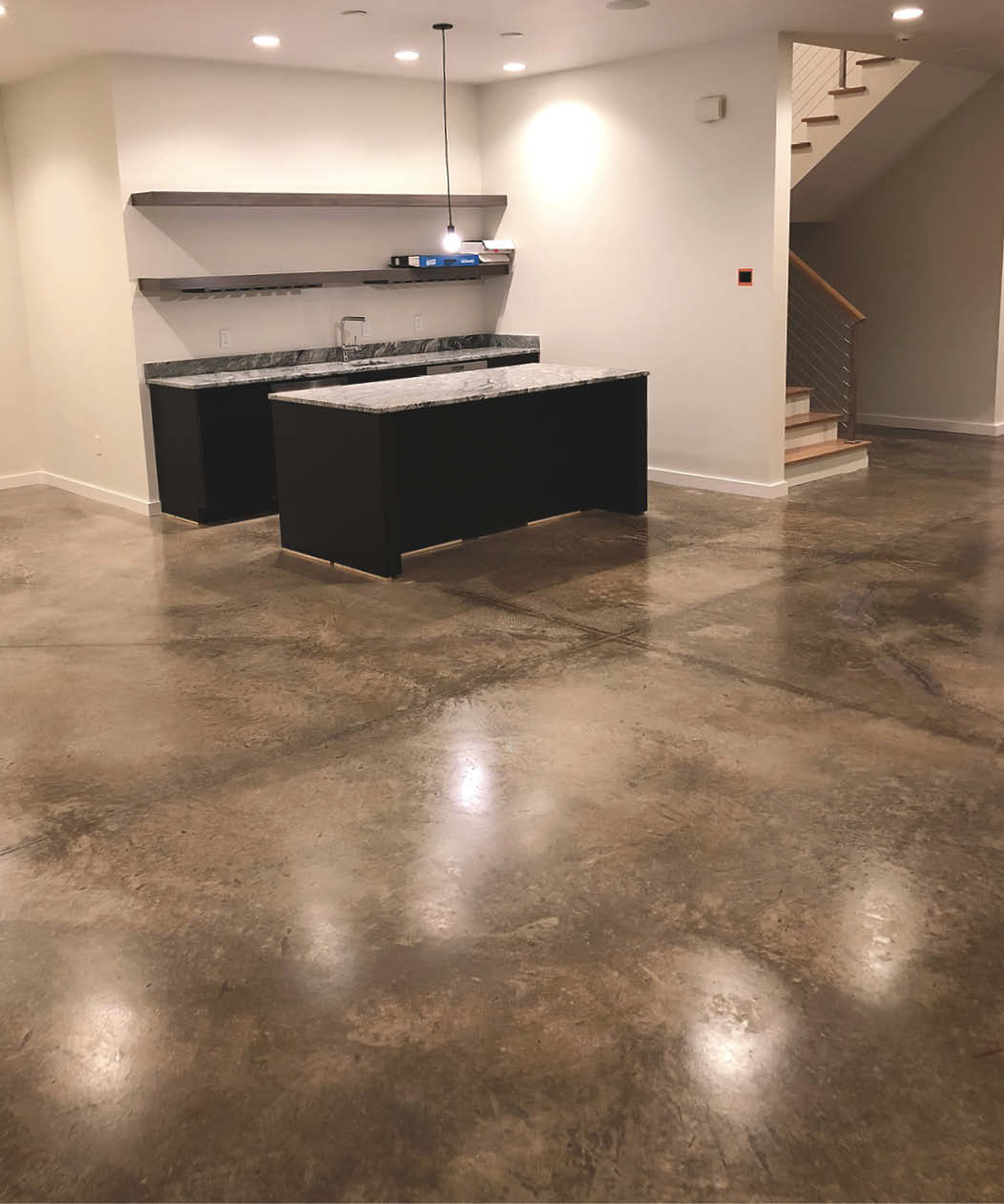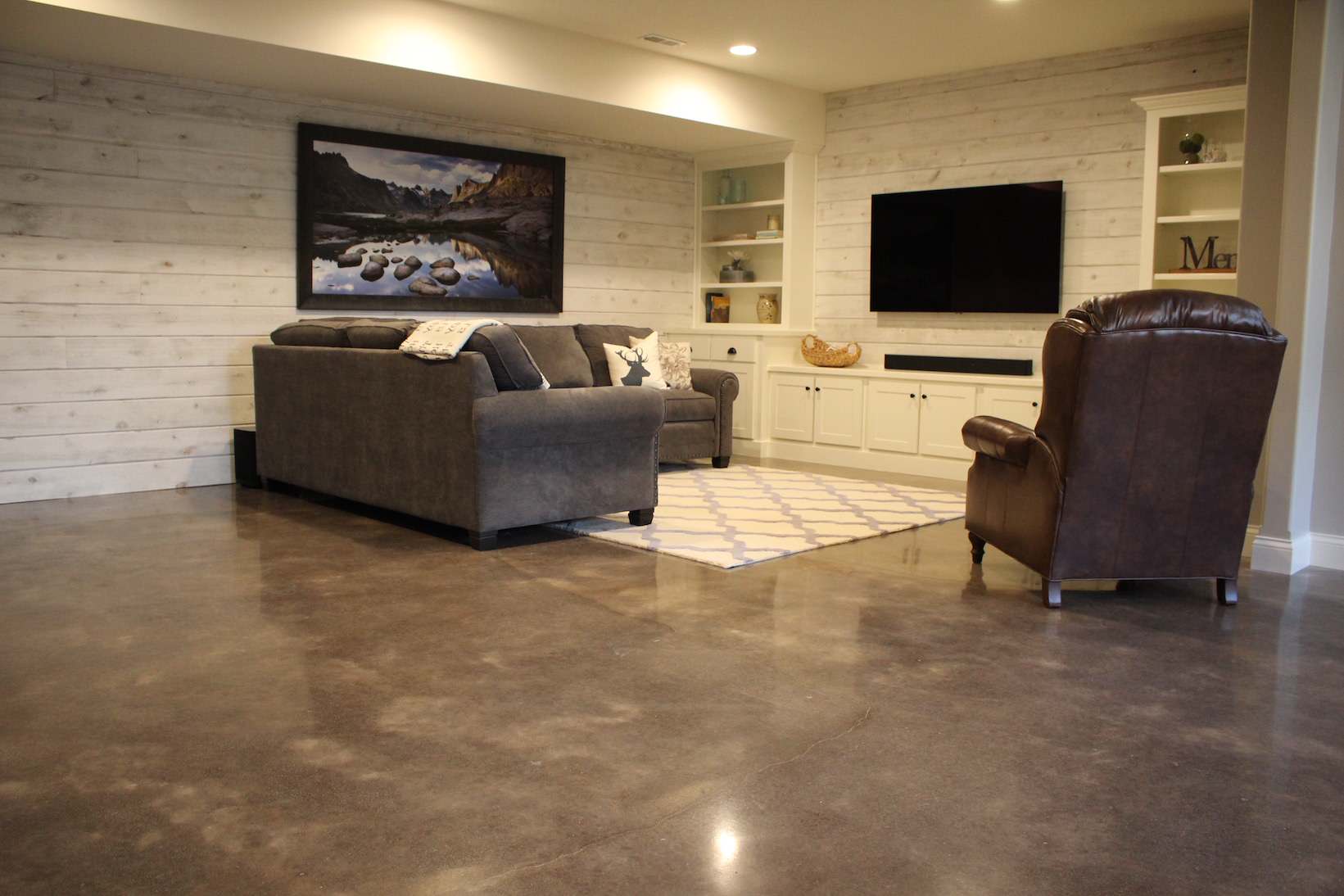Types of Concrete Basement Floor Finishes
Concrete basement floors can be finished in a variety of ways to enhance their appearance and functionality. These finishes not only provide a polished and refined look but also help to protect the concrete from damage and wear. Here are some popular types of concrete basement floor finishes:
- Epoxy Coatings: Epoxy coatings are a popular choice for basement floors due to their durability and resistance to stains, chemicals, and moisture. These coatings create a smooth and glossy surface that is easy to clean and maintain. Epoxy coatings can be customized with different colors, patterns, and textures to achieve the desired aesthetic.
- Stained Concrete: Staining is a technique that involves applying a translucent color to the concrete surface to create a natural and rich appearance. Acid-based stains penetrate the concrete and react with its minerals, resulting in unique and variegated colors. Water-based stains offer a wider range of colors and are more environmentally friendly. Stained concrete basement floors can be sealed to enhance their durability and protect against moisture.
- Polished Concrete: Polished concrete is achieved by mechanically grinding the concrete surface to a smooth and reflective finish. This process involves using progressively finer grinding tools to remove the top layer of the concrete and reveal a polished surface. Polished concrete floors are highly durable, easy to clean, and can be customized with different levels of sheen and decorative patterns.
- Stamped Concrete Overlays: Stamped concrete overlays are a popular choice for homeowners looking to replicate the look of natural materials such as brick, stone, or wood. These overlays are applied over the existing concrete surface and stamped with textured mats to create the desired pattern. Stamped concrete overlays can be colored and sealed to provide a realistic and long-lasting finish.
- Decorative Concrete Overlays: Decorative concrete overlays offer endless design possibilities for basement floors. These overlays are applied over the existing concrete surface and can be customized with different colors, patterns, and textures. They can mimic the look of various materials such as tile, slate, or marble, giving the basement floor a high-end and luxurious appearance.

Benefits of Using Concrete for Basement Floors
Durability: Concrete is known for its exceptional strength and durability, making it an ideal choice for basement floors. It can withstand heavy loads and is highly resistant to wear and tear, ensuring longevity and minimizing the need for frequent repairs or replacements.
Moisture Resistance: Basements are prone to moisture-related issues such as dampness and water seepage. Concrete is naturally moisture-resistant, making it an excellent choice for basement floors. It helps prevent the growth of mold, mildew, and other moisture-related problems, creating a healthier and safer living environment.
Cost-Effective: Concrete is a cost-effective option for basement floors. Its initial installation cost is relatively low compared to other flooring materials, such as hardwood or carpet. Additionally, its durability and low maintenance requirements contribute to long-term cost savings.
Versatility: Concrete offers a wide range of design options, allowing homeowners to customize their basement floors according to their preferences. It can be stained, stamped, or polished to create various decorative finishes, transforming the basement into a stylish and inviting space.
Thermal Efficiency: Concrete has excellent thermal properties, meaning it can help regulate the temperature in the basement. It can absorb and retain heat, making the space warmer during colder months and cooler during hot summers. This thermal efficiency can contribute to energy savings and improved comfort.
Easy Maintenance: Concrete basement floors are easy to clean and maintain. Regular sweeping and occasional damp mopping are usually sufficient to keep them in good condition. Unlike other flooring materials that may require specialized cleaning products or techniques, concrete floors are hassle-free to maintain.
Eco-Friendly: Concrete is an environmentally friendly flooring option for basements. It is made from natural materials, such as cement, aggregate, and water, and does not release harmful chemicals or emit volatile organic compounds (VOCs). Additionally, its long lifespan and recyclability contribute to its sustainability.
Allergen-Free: Concrete basement floors do not harbor allergens like dust mites, pollen, or pet dander, making them an excellent choice for individuals with allergies or respiratory conditions. This feature can significantly improve indoor air quality and reduce the risk of allergic reactions.
Factors to Consider When Choosing a Concrete Basement Floor Finish
- Durability: One of the most important factors to consider when choosing a concrete basement floor finish is its durability. The basement is often a high-traffic area and is prone to moisture, so it is crucial to select a finish that can withstand heavy use and potential water damage.
- Moisture Resistance: Since basements are below ground level, they are more susceptible to moisture issues. It is essential to choose a concrete floor finish that has excellent moisture resistance to prevent any water damage or mold growth. A moisture-resistant finish will help to maintain the structural integrity of the basement floor.
- Slip Resistance: Safety is a significant concern when selecting a concrete basement floor finish. The floor can become slippery, especially when wet. Choosing a finish with slip-resistant properties will help to prevent accidents and provide a secure surface for walking.
- Aesthetics: The appearance of the basement floor is another factor to consider. The finish should complement the overall design and style of the basement. Whether you prefer a polished, stained, or decorative finish, it is essential to choose a concrete basement floor finish that enhances the visual appeal of the space.
- Maintenance Requirements: Consider the maintenance requirements of the concrete floor finish before making a decision. Some finishes may require regular sealing or waxing, while others may be low-maintenance. It is crucial to choose a finish that aligns with your maintenance preferences and capabilities.
- Cost: Cost is always a factor to consider when choosing any type of flooring. Concrete basement floor finishes can vary in price depending on the material and finish options. It is important to set a budget and choose a finish that fits within your financial means while still meeting the desired criteria.
- Installation Process: Lastly, consider the installation process of the chosen concrete basement floor finish. Some finishes may require professional installation, while others may be suitable for DIY projects. It is essential to assess your skills and resources to determine the most suitable installation method for your specific needs.
DIY vs. Professional Installation of Concrete Basement Floor Finishes
When it comes to installing concrete basement floor finishes, homeowners have the option to either tackle the project themselves or hire a professional. Both options have their advantages and considerations that should be taken into account.
DIY installation of concrete basement floor finishes offers homeowners the opportunity to save money on labor costs. By doing the project themselves, homeowners can potentially cut expenses significantly. Additionally, DIY projects allow for a sense of pride and accomplishment, as homeowners can take ownership of the entire process from start to finish.
However, there are several factors to consider before deciding to install concrete basement floor finishes on your own. Firstly, it requires a certain level of skill and expertise to properly install the finishes. Without the necessary knowledge and experience, homeowners may encounter challenges that could result in a subpar final product.
Furthermore, DIY installations may lack the professional touch and precision that can be achieved when hiring a skilled contractor. Professionals have access to specialized tools and techniques that can ensure a flawless finish. Additionally, they have the knowledge to address any specific challenges that may arise during the installation process.
On the other hand, opting for professional installation of concrete basement floor finishes eliminates the need for homeowners to invest time and effort into the project. Professionals have the necessary skills, experience, and tools to complete the installation efficiently and effectively. By hiring a professional, homeowners can have peace of mind knowing that the job will be done correctly.
However, professional installation does come at a cost. Hiring a contractor can be significantly more expensive than doing the project yourself. Homeowners should carefully consider their budget and weigh the benefits of professional expertise against the additional expense.
Alternative Finishes for Interior Concrete Floors – Concrete Decor
75 Concrete Floor Basement Ideas Youu0027ll Love – June, 2022 Houzz
9 Basement Flooring Ideas for Your Home – Bob Vila
Benefits of Basement Flooring Finishes – Zenith Painting u0026 Coatings
Decorative Concrete Basement Floor Osage Beach, MO Acid Stained w/ Epoxy Finish
Basement Floor Coating – Galaxy Concrete Coatings
Epoxy Basement Floor: Bringing Life to a Hitherto Forgotten Dingy Room
Related Posts:









